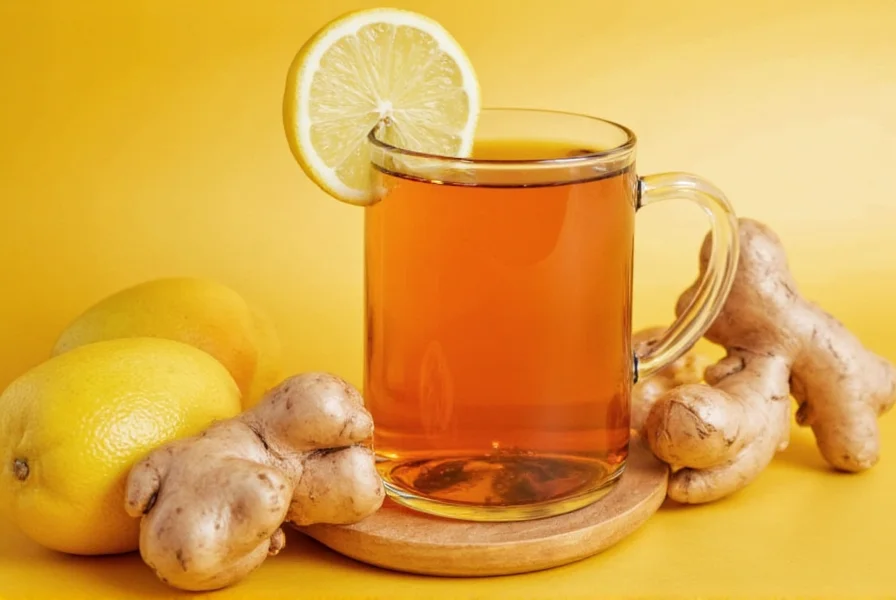For centuries, cultures worldwide have turned to ginger and lemon tea as a natural remedy for various health concerns. Modern research now validates many of these traditional uses, revealing the powerful synergy between these two ingredients. This comprehensive guide explores the evidence-based benefits of this popular herbal infusion, separating scientific fact from wellness folklore.
The Science Behind Ginger and Lemon Tea Benefits
Ginger and lemon tea combines two potent natural ingredients, each bringing unique compounds that work together to enhance health. Ginger contains gingerol, a bioactive compound responsible for its distinctive flavor and many therapeutic properties. Lemon contributes citric acid and a significant amount of vitamin C, along with flavonoids that boost the tea's overall antioxidant capacity.
When combined in tea form, these ingredients create a synergistic effect that enhances their individual benefits. Research published in the Journal of Medicinal Food demonstrates that the combination of citrus and ginger compounds increases antioxidant activity beyond what either ingredient provides alone. This makes ginger lemon tea particularly effective at combating oxidative stress in the body.

Top Evidence-Based Health Benefits
Immune System Support
The vitamin C in lemon works alongside ginger's antimicrobial properties to strengthen your body's natural defenses. A clinical study in the Nutrients journal found that regular consumption of vitamin C-rich beverages reduced the duration of upper respiratory infections by 8% in adults. While not a cure for illnesses, ginger lemon tea provides valuable support during cold and flu season.
Digestive Health Improvement
Ginger has long been used to alleviate digestive discomfort, and scientific evidence supports this traditional use. Research in the World Journal of Gastroenterology confirms that ginger stimulates gastric motility and reduces nausea. The citric acid in lemon aids digestion by promoting saliva production and supporting healthy stomach acid levels. Many people find relief from occasional indigestion by drinking ginger lemon tea 20 minutes before meals.
Anti-Inflammatory Properties
Chronic inflammation contributes to numerous health conditions, and ginger's potent anti-inflammatory effects offer natural protection. The gingerol in ginger inhibits inflammatory pathways in the body similar to some non-steroidal anti-inflammatory drugs (NSAIDs), but without the potential side effects. Regular consumption of ginger lemon tea may help reduce markers of inflammation, particularly beneficial for those with occasional joint discomfort.
| Benefit | Key Compounds | Scientific Support Level |
|---|---|---|
| Immune Support | Vitamin C, Gingerol | Strong clinical evidence |
| Digestive Aid | Gingerols, Citric Acid | Well-established research |
| Anti-Inflammatory | 6-Gingerol, Flavonoids | Substantial evidence |
| Hydration Boost | Electrolytes, Water | General consensus |
Optimal Preparation for Maximum Benefits
To maximize the health benefits of ginger lemon tea, preparation matters. Fresh ingredients provide significantly more active compounds than powdered or bottled alternatives. Here's a science-backed preparation method:
- Use 1-2 inches of fresh ginger root, thinly sliced or grated
- Boil in 2 cups of filtered water for 10-15 minutes (longer boiling increases gingerol extraction)
- Remove from heat and add the juice of half a lemon
- Let steep for 5 minutes before drinking
Avoid adding honey or sugar, which can negate some benefits. If needed, a small amount of raw honey may be added after the tea cools below 140°F (60°C) to preserve its enzymatic benefits. For those exploring how to make ginger lemon tea for maximum antioxidant benefits, research suggests consuming it warm rather than hot preserves more vitamin C.
Safety Considerations and Potential Side Effects
While generally safe, certain individuals should exercise caution with ginger lemon tea. People taking blood thinners should consult their healthcare provider before regular consumption, as ginger may enhance the effects of these medications. Those with gastroesophageal reflux disease (GERD) might experience increased symptoms due to lemon's acidity.
The recommended daily limit is 3-4 cups for most adults. Excessive consumption (more than 5 grams of ginger daily) may cause mild digestive upset in sensitive individuals. Pregnant women should limit intake to 1 gram of ginger daily and consult their healthcare provider about ginger lemon tea benefits during pregnancy.

When to Drink Ginger Lemon Tea for Specific Benefits
Timing your consumption can enhance specific benefits of this herbal tea:
- Morning: Drink upon waking to stimulate digestion and provide hydration after sleep
- Before meals: Consume 20 minutes prior to eating to support digestive enzyme production
- After travel: Helps combat motion sickness and rehydrate
- Evening: Opt for a weaker brew to avoid potential sleep disruption from ginger's mild stimulating effect
For those specifically interested in ginger lemon tea benefits for weight management, drinking it before meals may help with portion control by promoting feelings of fullness. However, it's not a magic solution for weight loss and works best as part of a balanced diet and exercise routine.
Ginger Lemon Tea vs. Other Herbal Teas
While many herbal teas offer health benefits, ginger lemon tea stands out for its unique combination of properties. Unlike chamomile (primarily calming) or peppermint (focused on digestion), ginger lemon tea provides a broader spectrum of benefits. Its vitamin C content exceeds that of most other herbal teas, while ginger's anti-nausea properties make it more versatile than single-ingredient options.
For those exploring does ginger lemon tea help with digestion compared to other options, research suggests it outperforms many single-ingredient teas due to the synergistic effect between ginger's prokinetic properties and lemon's acid-stimulating effects.
Conclusion
Ginger and lemon tea represents a simple yet powerful addition to a healthy lifestyle. The scientific evidence supporting its immune-boosting, digestive, and anti-inflammatory benefits continues to grow, validating centuries of traditional use. By understanding the proper preparation methods and consumption timing, you can maximize the health benefits of ginger and lemon tea while avoiding potential side effects. As with any natural remedy, consistency matters more than intensity—regular moderate consumption yields better results than occasional heavy intake.
Frequently Asked Questions
How often should I drink ginger lemon tea for health benefits?
For optimal benefits without potential side effects, most health experts recommend 1-3 cups daily. Consuming ginger lemon tea consistently provides better results than occasional heavy consumption. Those using it for specific concerns like digestion may benefit from drinking it 20 minutes before meals, while those seeking immune support might prefer morning consumption.
Can ginger lemon tea help with weight loss?
Ginger lemon tea alone won't cause significant weight loss, but it can support weight management efforts. The tea may help control appetite when consumed before meals and provides a zero-calorie alternative to sugary beverages. Some studies suggest ginger may slightly increase metabolic rate, but these effects are modest. For best results, incorporate ginger lemon tea as part of a balanced diet and regular exercise routine.
When is the best time to drink ginger lemon tea?
The ideal timing depends on your goals. For digestion, drink 20 minutes before meals. For immune support, morning consumption works well. If using it for nausea relief, sip it whenever symptoms occur. Avoid drinking strong ginger tea close to bedtime as ginger may have mild stimulating effects for some people. Those exploring ginger lemon tea benefits for morning sickness often find relief by sipping small amounts throughout the day.
Are there any medication interactions with ginger lemon tea?
Yes, ginger may interact with blood thinners like warfarin, potentially increasing bleeding risk. It might also enhance the effects of diabetes medications, leading to low blood sugar. Lemon's acidity could affect how certain medications are absorbed. If you take prescription medications, especially for blood conditions, diabetes, or heart issues, consult your healthcare provider before regularly consuming ginger lemon tea.
Does ginger lemon tea lose benefits when heated?
Heating affects different compounds differently. Ginger's beneficial compounds actually increase with longer boiling times, while lemon's vitamin C degrades with prolonged high heat. For maximum benefits, boil the ginger first for 10-15 minutes, then remove from heat before adding fresh lemon juice. This preserves more vitamin C while extracting maximum gingerol from the ginger root.











 浙公网安备
33010002000092号
浙公网安备
33010002000092号 浙B2-20120091-4
浙B2-20120091-4